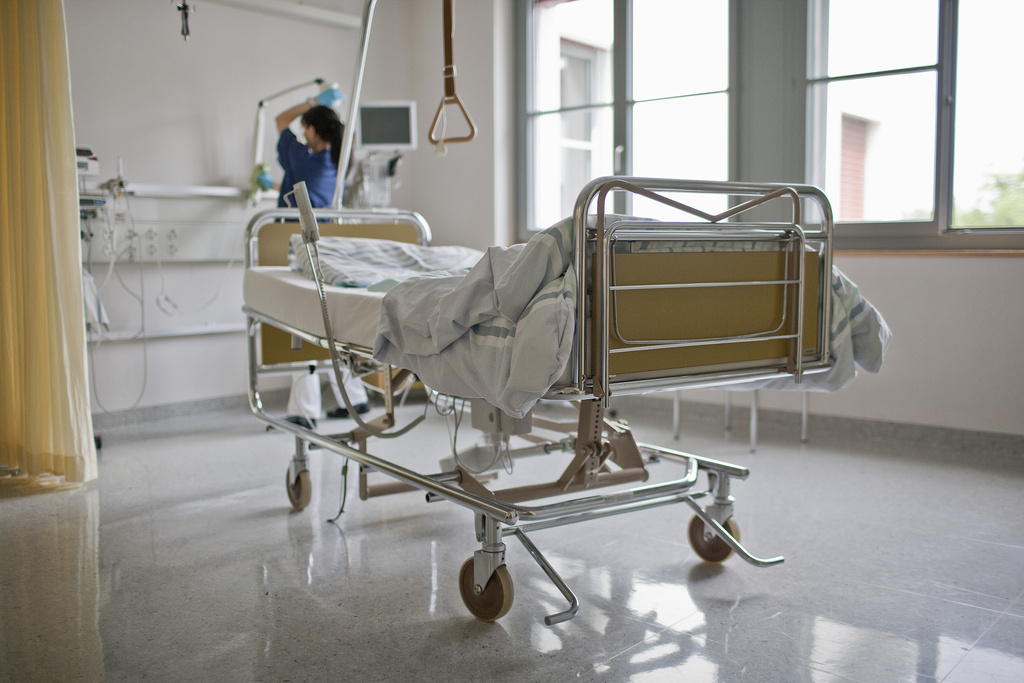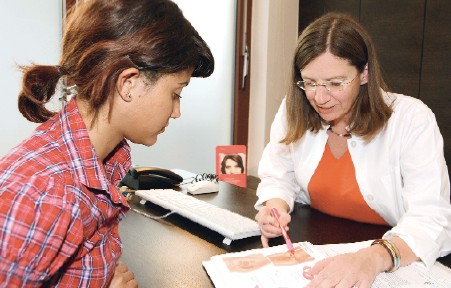Swiss health system diagnoses more cancer

Cases of melanoma, prostate and breast cancer are higher in Switzerland than the European average - a side-effect of the top-notch Swiss health care system.
Leading cancer specialist Giorgio Noseda tells swissinfo.ch the system helps diagnose cases early on, thereby increasing the numbers. But there is no single reason why Switzerland has higher cancer rates.
Noseda, who heads the Swiss Institute for Research in Biomedicine, says one of the main challenges for the near future is to get a clearer picture of the situation to improve prevention efforts.
Four out of ten people – or 35,000 patients – are diagnosed with cancer in Switzerland annually, according to a study of cancer cases between 1983 and 2007.
Actual deaths from skin and prostate cancer are slightly higher, while the number of fatal cases of breast cancer are lower compared with the average of 40 European countries, the Federal Statistics Office said on Monday.
swissinfo.ch: How does one explain the main findings of the study, notably the higher rate of skin, breast and prostate cancer in Switzerland?
Giorgio Noseda: There is no straightforward explanation at the moment. We can make certain informed assumptions. For instance, in the case of prostate cancer it is most likely due to the high quality of the health system and a higher number of diagnoses than in other countries.
Many people who were diagnosed with cancer were elderly people, but many of them actually died because of other reasons.
In the case of skin cancer it could be the result of the increasing number of Swiss who have exposed themselves to the sun without adequate skin protection.
And for breast cancer it could be because of a hormone therapy, prescribed to women in menopause. Treatment is more widespread in Switzerland than in other European countries.
swissinfo.ch: Which areas in the fight against cancer have benefited most from prevention efforts and therapy over the past few years?
G.N.: The focus was on two general health and nutrition recommendations by the Swiss Cancer League: Stop smoking and reduce consumption of alcohol and red meat; and instead eat more fruit and vegetables and do physical exercise.
The authorities have also invested a lot into early diagnosis. To take a concrete example: Women over the age of 50 are regularly screened for breast cancer. The discovery of a tumor allows for early treatment.
These screenings are a key factor to explain why cases of breast cancer have increased considerably over the past years but the number of cancer-related deaths have dropped.
Uterine cancer is another case in point. Tests and early diagnoses often allowed us to intervene at the right time to prevent the growth of the tumor.
The same goes for cancer of the colon: Early detection improves the chances of successful treatment.
swissinfo.ch: You mentioned the strong ability of the Swiss health system to combat cancer. Are you saying the anti-cancer treatment here is better than elsewhere?
G.N.: Switzerland offers the same treatments as other countries; treatment methods are the same at the international level. There are three possibilities: surgery, radiotherapy and chemotherapy – or a combination of the three.
What is different though is that the application of these methods is widespread across Switzerland. As a consequence we achieve better results compared not only with eastern European countries but also with our neighbours, Germany, France and Italy.
Unlike other countries, Switzerland does not have a central research institute specialising in the fight against cancer. Centres of competence for tumor treatment also exist in university hospitals and at a cantonal level.
Therefore patients have access to tumor treatment across the country.
swissinfo.ch: What are the main areas of cancer research in the near future?
G.N.: Four out of ten people are diagnosed with cancer in Switzerland every year and about 16,000 patients die of tumor-related diseases.
All sides involved at the moment are focusing on preparing a nationwide programme to fight cancer. The main aim of the programme – to be published by April – is to get a clear picture of the current situation.
It will help us understand the causes, define possible preventive measure and seek effective and efficient therapies.
Tumors are the second cause of death in Switzerland.
30% of men and 23% of women die of cancer-related deaths.
In total 16,000 people die of cancer every year, according the Federal Statistics Office.
Noseda was president of the Swiss Cancer League (1989-1992), the Foundation Cancer Research Switzerland (1990-2006) and Oncosuisse (1999-2006). Since 2000 he has been leading the Institute for Research in Biomedicine in Bellinzona.
He has contributed to the creation of a National Institute of Cancer Epidemiology. Its aim is to study the risk factors and incidence rates of tumors in Switzerland.
Noseda also helped established Biobank Suisse – a foundation to promote cancer research and set up a database for the purpose of medical studies.
Noseda, 71, studied cardiology and internal medicine and worked as a senior consultant at hospitals in Mendrisio and Lugano in southern Switzerland.
He was also a professor at Bern University.
(Adapted from Italian by Urs Geiser)

In compliance with the JTI standards
More: SWI swissinfo.ch certified by the Journalism Trust Initiative











You can find an overview of ongoing debates with our journalists here . Please join us!
If you want to start a conversation about a topic raised in this article or want to report factual errors, email us at english@swissinfo.ch.